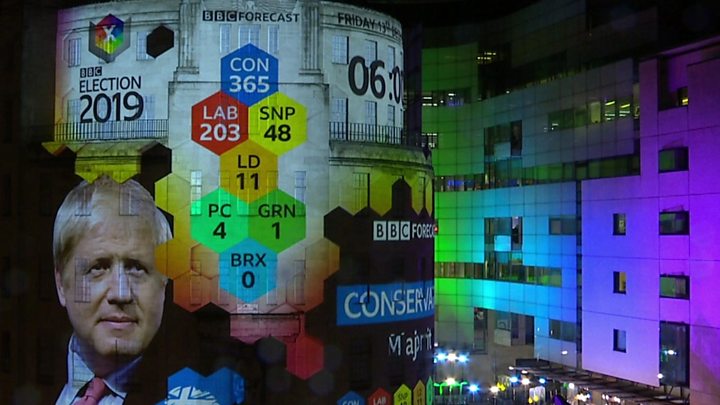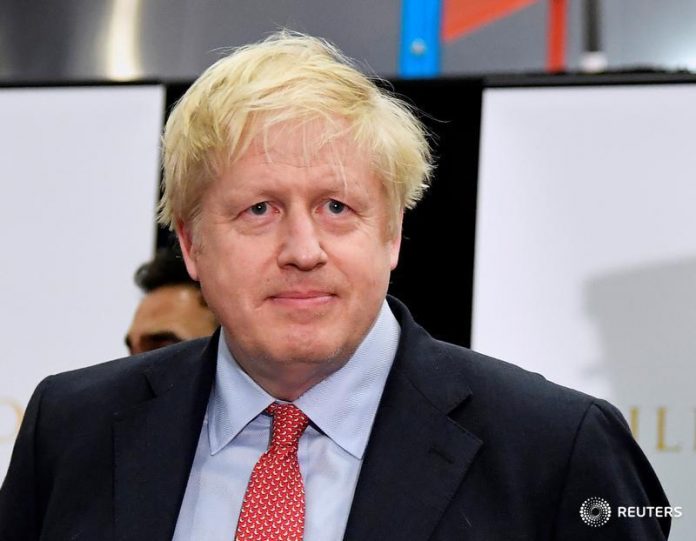|
Getting your Trinity Audio player ready...
|
Boris Johnson has said he will work “night and day” to repay the trust of voters after he led the Conservatives to an “historic” election victory.
With just two seats left to declare, the Tories have a majority of 76.
Speaking in London, the PM said it was a mandate to take the UK out of the EU next month “no ifs, no buts”.
Jeremy Corbyn has said he will not fight another election as Labour leader after the party was swept aside in its traditional heartlands.
In a victory speech, Mr Johnson told activists “we did it” and it was a “new dawn” for the country – echoing comments Tony Blair made when he won power in 1997.
He thanked Labour voters, many of whom, he said, had backed the Conservatives for the first time, saying he would lead a “people’s government” and fulfil the “sacred trust” placed in him.
“You may intend to return to Labour next time round, and if that is the case, I am humbled that you have put your trust in me, and I will never take your support for granted.
“I will make it my mission to work night and day, flat out to prove that you were right in voting for me this time, and to earn your support in the future,” he said.

“And I say to you that in this election your voice has been heard, and about time too.
“The people want change…we cannot and we must not let them down.”
With just one constituency left to declare, the Conservatives have 364 MPs, Labour 203, the SNP 48, Liberal Democrats 11 and the DUP eight.
Sinn Fein have seven MPs, Plaid Cymru four, the SDLP have two; and the Green Party and Alliance Party one each.
That means the Conservatives will have their biggest majority at Westminster since Margaret Thatcher’s 1987 election victory.
Labour, which has lost seats across the North, Midlands and Wales in places which backed Brexit in 2016, is facing its worst defeat since 1935; while Jo Swinson has quit as Liberal Democrat leader after losing her seat to the SNP.

Mr Johnson said the Tories’ thumping victory had “smashed the roadblock” in Parliament over Brexit and put an end to the “miserable threats” of another referendum on Europe.
“We will get Brexit done on time by 31 January, no ifs, no buts, not maybe.”
Speaking earlier after he was re-elected as MP for Uxbridge and South Ruislip, Mr Johnson said there had been a political earthquake overnight, with the Tories winning a “stonking” mandate, from Kensington to Clwyd South.

Johnson’s gamble pays off
The same prime minister. But a new map.
A victory bigger than the Tories, haunted by 2017, had dreamt of. As the hours ticked by, red flipped to blue, familiar faces forced out of their seats.
Boris Johnson gambled that he could win an election with support from towns and communities where voting Conservative might almost have seemed a sin.
And he won.
The Conservatives’ majority will have an almost immediate effect on the country – unless something strange happens we will leave the European Union next month because behind him on the green benches will be new Tory MPs who will vote through his Brexit bill, his position strong enough to subdue any opposition.

Labour’s share of the vote at 33% is lower than that achieved by Neil Kinnock in 1992.
Some traditional Labour constituencies, such as Darlington, Sedgefield and Workington, in the north of England, will have a Conservative MP for the first time in decades – or in the case of Bishop Auckland and Blyth Valley – for the first time since the seat was created.
Speaking at his election count in Islington North, where he was re-elected with a reduced majority, Mr Corbyn said Labour had put forward a “manifesto of hope” but “Brexit has so polarised debate it has overridden so much of normal political debate”.
Labour’s vote is down around 8% on the 2017 general election, with the Tories up by just over 1% and the smaller parties having a better night.
In other developments:
- Jo Swinson – who only became Lib Dem leader in July and began the election campaign by saying she aimed to be prime minister – lost her Dunbartonshire East seat to the SNP by 149 votes
- Sir Ed Davey and Lib Dem president Sal Brinton are taking over as interim party leaders
- Nigel Dodds, the leader of the Democratic Unionist Party at Westminster, lost his Belfast North seat to Sinn Fein
- The Lib Dems took Richmond Park, in south-west London, from Conservative minister Zac Goldsmith but high-profile former Tory and Labour recruits Chuka Umunna, Luciana Berger and Sam Gyimah failed to win a seat
- Labour’s Caroline Flint – who backed the Tory Brexit deal in defiance of her party – lost in Don Valley to the Tories
- Labour’s longest-serving MP Dennis Skinner also lost his seat to the Conservatives
- Remain-backing former Tory minister Dominic Grieve came second to the Conservative candidate in Beaconsfield
- Anna Soubry, who quit the Tories to form a pro-Remain group of MPs, lost her Nottinghamshire seat to the Tories
Scottish National Party leader and Scotland’s First Minister Nicola Sturgeon said it had been an “exceptional night” for her party.
She said Scotland had sent a “very clear message” that it did not want a Boris Johnson Conservative government and the prime minister did not have a mandate to take Scotland out of the EU.
It was also a “strong endorsement” for Scotland having a choice over its own future in an another independence referendum, she added.
Source : BBC News





